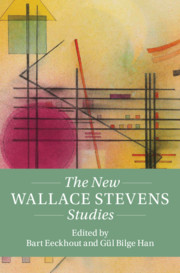Book contents
- The New Wallace Stevens Studies
- Twenty-First-Century Critical Revisions
- The New Wallace Stevens Studies
- Copyright page
- Contents
- Contributors
- Abbreviations
- Introduction That Which Is Always Beginning
- Part I Emerging Concepts in Stevens Criticism
- Part II Recent Critical Methods Applied to Stevens
- Part III Revisionary Readings of Stevens
- Chapter 12 Poetic Responses
- Chapter 13 Poetic Fiction
- Chapter 14 Poetic Thinking
- Chapter 15 Constructive Disorderings
- Chapter 16 Manner and Manners
- Chapter 17 Lyrical Ethics
- Index
- References
Chapter 13 - Poetic Fiction
from Part III - Revisionary Readings of Stevens
Published online by Cambridge University Press: 18 June 2021
- The New Wallace Stevens Studies
- Twenty-First-Century Critical Revisions
- The New Wallace Stevens Studies
- Copyright page
- Contents
- Contributors
- Abbreviations
- Introduction That Which Is Always Beginning
- Part I Emerging Concepts in Stevens Criticism
- Part II Recent Critical Methods Applied to Stevens
- Part III Revisionary Readings of Stevens
- Chapter 12 Poetic Responses
- Chapter 13 Poetic Fiction
- Chapter 14 Poetic Thinking
- Chapter 15 Constructive Disorderings
- Chapter 16 Manner and Manners
- Chapter 17 Lyrical Ethics
- Index
- References
Summary
Apart from three early experiments in playwriting, Wallace Stevens was almost entirely a poet. Yet the fact that Stevens positioned himself so adamantly in the realm of poetry and kept away from the art of the novel does not mean he did not ponder questions of aesthetic affinity. In a 1948 letter, for instance, he shared his perspective on Marcel Proust: “The only really interesting thing about Proust that I have seen recently is something that concerned him as a poet. It seems like a revelation, but it is quite possible to say that that is exactly what he was and perhaps all that he was.” When we consider Proust’s use of similes as well as the way Proust intertwines his studies of the senses, time, and the resources of memory in his monumental work, we begin to grasp Stevens’s appreciation of the French novelist. Goldfarb’s chapter amplifies Proust’s presence in Stevens in three segments: the first addresses Stevens’s relation to modernist fiction; the second probes Stevens’s insight into Proust’s writing style; the third focuses on Proustian echoes in Stevens’s verse, particularly on the interlacing themes of the senses, time, and memory in shorter poems across different volumes.
- Type
- Chapter
- Information
- The New Wallace Stevens Studies , pp. 174 - 185Publisher: Cambridge University PressPrint publication year: 2021



